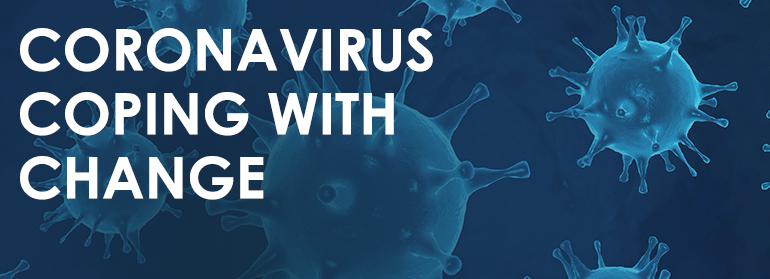
12 May Coping with Change
As you are all aware, the changes we have experienced in the last month or so due to the coronavirus
outbreak have been enormous and have happened at an extraordinarily fast rate. Our brains are
programmed to find comfort in familiarity and routine, whereby we can plan and feel prepared for the
events that lie ahead in our everyday lives. When change is suddenly thrust upon us, it can take us a
while to get used to new routines.
Some of us are really struggling to adapt to new ways of working and living, and some of us appear
to be thriving, finding joy in the small things in life or setting new challenges. If you are finding it all a
bit overwhelming, you are definitely not alone, so be kind to yourself. Try not to let seeing other people
apparently making the best of a situation, which you might be finding difficult, make you feel worse.
Remember, you are doing the best you can.
The changes we have been through and the uncertainties we face in the coming weeks can all heighten
our feelings of anxiety and make us feel frustrated, resentful or angry. We are likely to be feeling more
irritated than perhaps is usual for us. This is perfectly normal and is just our brains trying to keep us
safe. Our brains go through various stages, often unconsciously, in order to cope with any changes, such
as:
- Pre-contemplation – where we are largely unaware or unwilling to change
- Preparation – we know something needs to change and we are getting ourselves ready for it
- Action – this is where change happens, and we do something differently
- Maintenance – the change becomes normal and new habits are formed
Under normal circumstances, we have the time to work through these stages before change takes
place. However, in the current situation, we may feel that the changes have been imposed on us and we
have been thrown into the ‘Action’ stage without having the chance for our brains to catch up. Once
we understand the reasons for the changes, we are more likely to accept them, and this acceptance is
the key to coping positively with change.
One thing is certain, there will be many more changes in the weeks and months ahead.
We are all doing the best we can under these challenging circumstances. Be patient, be kind to
yourselves and remember, things will improve.
Tips on coping with change
- Recognise that any negative emotions either you or your children feel about the changes imposed on you are normal. Your brain is just trying to keep you safe
- You don’t have to like any change, e.g. not going out or not meeting friends, but trying to understand the reasons and looking for positive outcomes, e.g. keeping yourself and your family safe, can help
- Consider keeping a record of any changes you have made through this time and how you feel about them
- Remind your children of other changes they have already gone through, e.g. a house move or simply learning something new like riding a bike. Changes happen all the time and change can be a good thing
- Be aware of things you can control, e.g. what you eat and how to exercise safely. Try to accept the things
that are outside of your control and consider using the following affirmation, “I have the calmness to accept the things I cannot change, the courage to change the things I can, and the wisdom to know the difference” to remind yourself that you are doing okay - Try some mindfulness exercises, for example, on You Tube, an app such as ‘Headspace’, or listen to the Spotify ‘Peaceful meditation’ playlist (or similar) if you feel strong emotions
- Talk to each other about your feelings and work out some coping strategies together, e.g. “When I feel … then I will …”
- When you can, try to make this a positive experience, perhaps by playing games or having some fun together as a family. Laughter is a very effective way to relieve stress and anxiety
- Remember you are not alone and we will get through this


